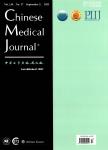Impact of imipenem treatment on colonic mycobiota in rats with double-hit sepsis
Impact of imipenem treatment on colonic mycobiota in rats with double-hit sepsis作者机构:Department of Critical Care and Emergency Medicine ShanghaiChangzheng Hospital Second Military Medical University Shanghai200003 China
出 版 物:《Chinese Medical Journal》 (中华医学杂志(英文版))
年 卷 期:2013年第126卷第10期
页 面:1850-1854页
核心收录:
学科分类:090603[农学-临床兽医学] 08[工学] 09[农学] 0906[农学-兽医学] 0901[农学-作物学] 0836[工学-生物工程] 090102[农学-作物遗传育种]
主 题:sepsis, imipenem mycobiota burn, endotoxin
摘 要:Background Broad-spectrum antibiotic administration promotes intestinal colonization of exogenous fungal pathogens in healthy animals and has been recognized as one of the risk factors of invasive fungal infection in clinical settings. It is unclear whether broad-spectrum antibiotic treatment would change the intestinal mycobiota without exogenous fungal challenge in the context of sepsis. Methods We established a rat model of double-hit sepsis using burn injury and endotoxin challenge. Rats with burn injury or double-hit sepsis received imipenem treatment for 3 days or 9 days, and their colon contents were sampled for selective fungal culture and isolation counts. Results Imipenem treatment promoted the overgrowth of the commensal fungus Geotrichum capitatum in rats with burn injury. Imipenem treatment also promoted colon colonization by exogenous fungi in rats with burn injury and double-hit sepsis, including Trichosporon cutaneum, Candida albicans, Candida krusei, and Candida glabrata. A longer duration of imipenem treatment had a stronger impact on colon colonization by exogenous fungi. Conclusion Imipenem treatment facilitates the overgrowth of commensal fungi and colonization by exogenous, potentially pathogenic fungi in the colons of rats with burn injury or double-hit sepsis.



